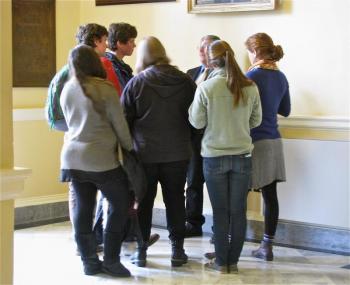Watershed students experience democracy first-hand
AUGUSTA — Watershed School students had two unusual opportunities to take part in the democratic process this past week. On Tuesday, the school's sophomores attended Maine Citizen Action Day at the State House in Augusta.
After staff scientists from the Natural Resources Council of Maine reviewed key environmental bills being considered by legislators, they walked to the State House to meet with their senators and representatives, sit in on the House and Senate while they were in session, attend a work session on a bill, and pick up copies of bills as they were being printed.
Then, on Saturday, members of the Watershed School community attended the Generation Climate Rising march in Augusta. The march was a student-organized event that brought together hundreds of high school, middle school and college students from Machias to Portland to Fryeburg. Its aim was to press the current administration for meaningful action on climate change.
The visit to the State House was an eye-opening one and the students had many reactions. Warren Galloway observed that the whole process was "a lot more touch-and-go than I expected, but also surprisingly effective."
The class was surprised by the friendliness, intensity and "excited buzz" in the hall that connects the House and Senate chambers. Warren was amazed by how well everyone knew each other, "they'd talk as if they were visiting friends, and yet they were all voting with or against each other on state bills."
Classmate Isabel Hamill learned from a legislator that they sometimes vote a certain way because their friends in the Legislature do, "sort of like high school," she noted.
Peter Galloway gained perspective on how government works and how state laws are made. He commented, "I didn't realize how important the voices of individuals in Maine are in influencing whether or not a bill will be passed or that most of our legislators are quite ordinary people who don't know much more than we do about the bills they vote on."
Jillian Galloway was impressed by the expertise and passion of the staff scientists at the Natural Resources Council. She commented that "the lobbying process was not always civil" and was dismayed by how little some legislators knew about environmental bills, but she also learned that more than 1000 bills are printed and need to be evaluated each session.
Isabel Hamill agreed, "with so much information — how could lawmakers possibly understand it all?" The students experienced the detailed review of bills that happens at the committee level at what turned into a long and tedious committee work session on three forest ranger bills.
The students were particularly interested in bills relating to Maine's energy use. They went to the Legislative Document Room where they picked up a hot-off-the- press copy of LD 1263, a bill that would make it easier and more economical for homeowners to install solar panels, and they had a spontaneous conversation with Patrick Woodcock, the head of the Governor's Energy Office, and questioned him about the recent Public Utilities Commission decision to slash funding for Efficiency Maine.
Then on Saturday, a group from Watershed returned to Augusta to experience democracy in a different way by taking part in the largest student march in Maine's history. They were excited to learn about the rapidly growing number of students (known as Generation Climate Rising) who want Maine's leaders to take the issue of climate change seriously.
They heard many of their peers speak, ranging from an eloquent eighth grader from Fryeburg to college students from all over Maine.
Generation Climate Rising's demands were simple and forward-thinking: No new fossil fuel infrastructure in Maine, and adoption of policies and legislation that shift Maine from fossil fuels to renewables, more efficient cars, and more efficient buildings.
All in all, the week was both exciting and empowering and the students were excited to be part of a growing group of students who want their future to be taken seriously. As one student commented, we are "finding our voice."
Watershed students are learning first-hand that there are many ways to make their voices heard.



























